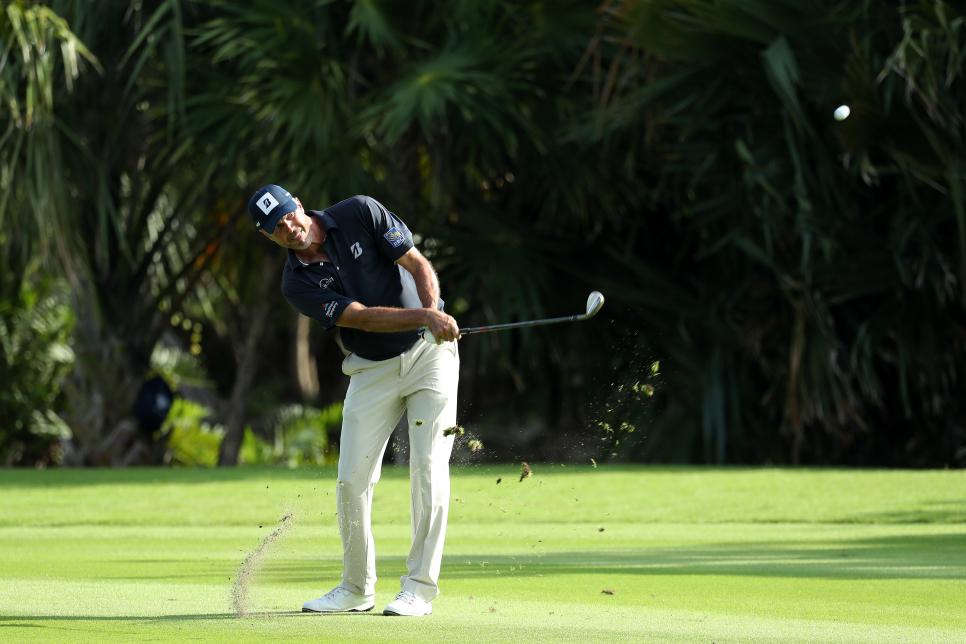Equipment
Matt Kuchar discusses how his recent golf-ball switch helped him earn his first win in five years

Rob Carr
Matt Kuchar is a smart guy and a veteran on the PGA Tour. After all, the man went to Georgia Tech and graduated with a degree in business. Recently, Kuchar—an eight-time winner on the PGA Tour—made a number of changes to his bag, including a big one: switching golf balls to Bridgestone’s Tour B X model. Kuchar won with the new ball last month at the Mayakoba Golf Classic. Kuchar recently spoke with Golf Digest’s equipment editor E. Michael Johnson about the new ball, his testing process—and why ball fitting isn’t just for tour professionals.
You’re typically a low-spin player, but you went to Bridgestone’s lower-spinning Tour B X ball. How’d that come about?
"My irons were starting to spin a little more due to some differences in technique that have crept into my swing. I was looking to bring some spin down with the irons because it had gotten to be too much. But you’re right, I’ve always been a low-spin players, and I played the XS ball for a number of years. I think some of the work that I’ve put in to hit the ball a little higher and spin it a little more just got to a point where I could use less spin, and this ball does that for me. I tried the Tour B X ball in Vegas and it brought the spin down. I tried a couple of drivers and the combination of the driver and ball had my ball speed going up a little bit. I thought it was a great combo."
You’ve made a lot of changes to your clubs recently—steel shafts in the irons, driver, etc.—what role does changing clubs have on your choice of golf ball?
"When you’re testing clubs you want to have a constant, so you want to start with the golf ball you’ve been playing. You want that to be the same. But once you’re past the initial point, it’s absolutely worth testing other balls to see if there’s another that will work better with your new equipment setup. Same with the swing. All of us would like to think our swings stay the same, but they do change, they do evolve, and with that, matching equipment is important. You want to make sure your ball and clubs match up with any change you make. I check lofts and lie angles on clubs and even the putter two or three times a year, and will make adjustments if my ball position moves or the ball’s not rolling off the face of the putter the way I want it to. Same with the golf ball. Changes can creep in that you’re not aware of, and you want the right ball for your game at that moment."
What is your process when testing golf balls? Is it launch monitor, on the golf course, a little of both?
"It’s mostly launch monitor early on then we take it to the golf course. The launch monitor can help you narrow down the choices. Then you go on the golf course and hit a bunch of drives, chips, play different styles of approach shots, etc. The golf course is definitely the end barometer, but the launch monitor at least gets you down to a manageable number of choices. It’s a full process for me. The performance off the driver and the wedges are perhaps the two most important parts to get dialed in, because it takes some work to find a golf ball that goes as far as possible and is still responsive around the greens. Sometimes you might have to give a little to get a little, but there’s no one set thing for me. It’s the total process and when I’m comfortable with it, it goes in."
How long does it normally take for you to be comfortable making a change?
"It’s pretty quick. Give me two full days, and I’d feel pretty comfortable."
Do you want to know the technology behind the product or do you let the performance speak for itself?
"Actually, when I’m testing I don’t want to know anything about the technology. I don’t want anything to bias me one way or another, so that allows me to provide untainted feedback. Then when it comes to the engineering and the properties of the golf ball, I am interested, and I do get a bit lost in the science that goes behind it, but I like to have a basic understanding of the technology."